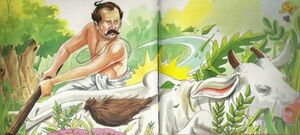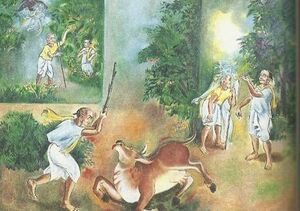Talk:Blaming the Lord for One’s Own Mistakes & Misfortunes
By Vishal Agarwal
A true Bhakti Yogī credits Bhagavn for his good fortunes and blames himself for his misfortunes. An imperfect Bhakta will blame the Lord for his own mistakes. The following story is narrated in the Hindu tradition-
A Brahmana was laying out a garden. He looked after it day and night.
One day a cow strayed into the that it died of the injuries received. The news soon spread like wildfire that the brahmana had killed the sacred animal. When anyone attributed the sin of that act to him, the brahmana, who professed to be a Vedantin, denied the charge, saying: “No, I have not killed the cow; it is my hand that had done it; and as god Indra is the presiding deity of the hand, it is he who has incurred the sin of killing the cow, not I.” Indra, in his heaven, heard of this. He assumed the shape of an old brahmana, and coming to the owner of the garden, said, “Sir, whose garden is this?”
Brahmana: Mine
Indra: It is a beautiful garden. You have got a skillful gardener; for see how neatly and artistically he has planted the trees.
Brahmana: Well, sir, that is all my work. The trees were planted under my supervision and direction.
Indra: Very nicely done, indeed! Who has laid out this path? It is very well-planned and neatly executed.
Brahmana: All that has been done by me. Then Indra said with folded hands, “When all these things are yours, and when you take credit for all the work done in this garden, it is not proper that poor Indra should be made responsible for killing the cow.[1]”
A true Bhakti Yogī who loves the Lord unselfishly accepts both the good and bad experiences of his life to the Lord as His gift. He credits the Lord for all good fortune and blames himself for any misfortunes.
References[edit]
- ↑ Tales and Parables of Sri Ramakrishna. Sri Ramakrishna Math, Mylapore, Madras, p. 66-68.


